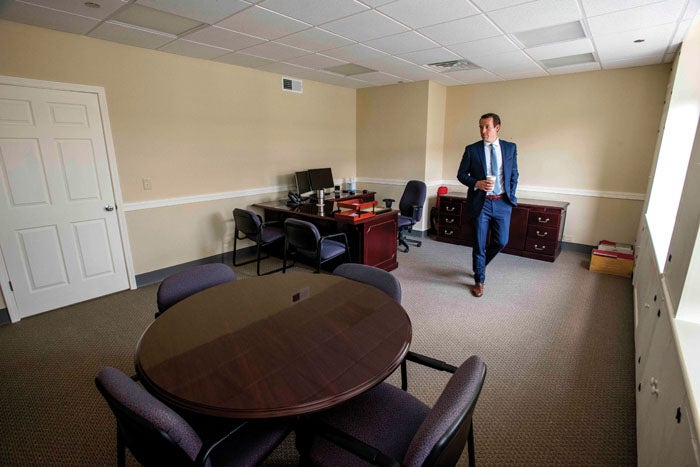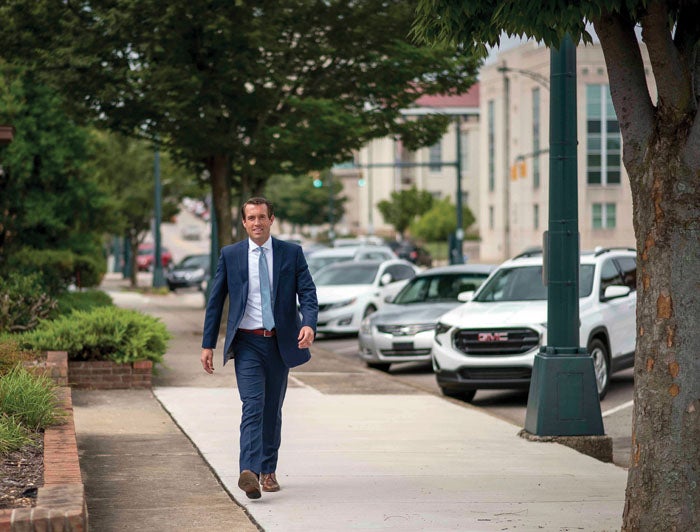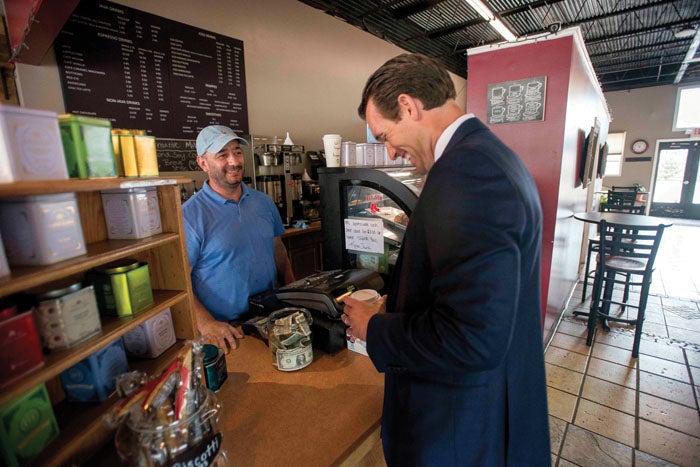With deep roots in Salisbury, new city attorney looks to a future with abundant possibilities
Published 12:00 am Sunday, July 1, 2018
By Susan Shinn Turner
For the Salisbury Post
SALISBURY — As a kid, Graham Corriher was fascinated with the way things work. That early interest has served him well in his law career.
On Monday, Corriher will become Salisbury’s city attorney.
City leaders wanted to return to having an in-house counsel, as it did in the 1980s, moving from a structure of two assistant city managers to having one assistant manager and a city attorney.
Rivers Lawther has been the city attorney for more than 30 years on a contract basis. He is a partner with the Woodson Law Firm.
From time to time, Corriher, a partner who joined the firm in 2015, assisted Lawther. He previously practiced with Tharrington Smith in Raleigh and Koontz & Smith in Salisbury.
The city attorney’s job was posted in October, but the City Council members who were elected in November had input in choosing the new city attorney.
“We were impressed with his legal skills and his demeanor, his experience in the community, and his aura of being a peacemaker,” says Mayor Pro Tem David Post, himself an attorney. “We had some extraordinary applicants from Salisbury and from around the state. He was extraordinarily prepared when he came to his interview.
“He was familiar with issues we were going to ask him, and that’s hard to do,” Post said. “He made it easy for us to pick him.”
Corriher, 33, grew up in China Grove, but he has deep roots in Salisbury. His mother, Nancy Corriher, was a member of the first graduating class of Salisbury High School. His grandfather, David Graham Jr., was an ABC law enforcement officer, what folks called a “revenuer.”
His great-grandfather, David Graham Sr., was the city jailer.
“Every weekend of my childhood was either spent in China Grove playing with cows or going to Richard’s Barbecue,” said Corriher, who grew up next to his paternal grandparents’ home place on N.C. 152 West. “Paw Paw and I would go to the Sheriff’s Office. Sheriff Bob Martin was his best friend. I’d shake hands with Sheriff Martin and see that missing trigger finger.”
At N.C. State University, Corriher earned a history degree with a minor in education. He taught social studies and coached basketball for two years at North Rowan High School.
He’s from a family of teachers. His parents were both teachers — his dad is John Corriher of China Grove — as were his grandmothers. His mom is now a “full-time grandmother,” Corriher says, and has kept all five of her grandchildren in various combinations.
“She is still teaching. She puts lesson plans together at home.”
Corriher and his wife, Danielle, also 33, have two children, Ruby, 4, and John Graham, who turns 2 this month.
The grandmothers share baby-sitting duties. His older sister, Katie Welch of China Grove, has three children with husband Josh: Will, 10, Reece, 6, and Whit, 4. Their oldest sister, Kendall Fulham, lives in Kannapolis with husband Nick.
Corriher is clearly infatuated with his children.
“He’s wild,” he said of John Graham. “He’s all boy, but he’s as sweet as he can be. Ruby painted his toenails not long ago. Ruby is too smart for her own good. She wants to talk. She’ll talk your ear off, but she’s wonderful.”
Both children are farsighted and both wear glasses.
The Corrihers married in 2010 and spent their first summer in Salisbury, as he worked with Koontz & Smith and clerked for Judge Charlie Brown.
Danielle Corriher is a speech therapist at Morgan Elementary School.
While teaching was a great fit for other family members, it was not the case for Corriher.
“I’ve always been interested in how things worked,” he said. “Law school was stimulating and interesting. I was able to think longer and more deeply about things than I was allowed to as a teacher. Teaching was also hard — plain and simple.”
The two years he taught, he spent summers in New York, volunteering with the New York Historical Society.
“The bright lights were appealing to someone from China Grove,” Corriher admitted. “I sowed some wild oats — not that wild. The work was fascinating.”
Corriher received a scholarship from the Chancellors Scholars Program — the graduate equivalent of the Morehead Scholarship — to attend law school at the University of North Carolina in 2009, graduating cum laude in 2012.
“I’m pleased with how everything has turned out,” Corriher said.
The young family moved to Ellis Street in 2014. They can walk to church at St. Luke’s Episcopal Church, and Corriher can walk to work. The family often takes walks together downtown.
“Like so many millennials, we love living downtown,” Corriher said, “but we never could afford to live in Durham or Raleigh.”
“We could have made it work in Durham, but we didn’t feel a connection to the place. We always felt displaced, always thought of home and wanted to come home. We wanted to raise our children in a place where people knew their names, knew their families, would love them and give their lives meaning beyond what school they went to or what profession they entered or what neighborhood they lived in or whatever.
“The exchange, of course, is a lack of anonymity, of being held accountable,” he continued. “And that’s OK. That’s a good thing to me.”
He quoted favorite author Wendell Berry on going home and the peace that came over him when he did.
“Far from being bored and diminished and obscured to myself by my life here, I had grown more alive and more conscious than I had ever been,” he said. “I had made a significant change in my relation to the place. Before, it had been mine by coincidence or accident; now it was mine by choice.
“My return, which at first had been hesitant and tentative, grew whole-hearted and sure. I had come back to stay. I hoped to live here the rest of my life. And once that was settled, I began to see the place with a new clarity and a new understanding and a new seriousness.
“Before coming back, I had been willing to allow the possibility that I already knew this place as well as I ever would. But now I began to see the real abundance and richness of it. It is, I saw, inexhaustible in its history, in the details of its life, in its possibilities.”
Corriher has quickly woven himself into the fabric of Salisbury. He serves on the Rowan Museum board. The Corrihers’ home was on OctoberTour in 2015. He serves on the Rotary Club board and has been on the United Way board.
He was in the Piedmont Players production of “A Time to Kill.” His wife was pregnant with John Graham then, but he had so much fun.
Now, with two young children at home, Corriher had to say no to the Robert Redford role in a local production of “Barefoot in the Park.”
Corriher said his wife is “the most supportive woman I could ask for. She keeps me in check. She’s wonderful.”
Steve Fisher, president and CEO of F&M Bank, has served with Corriher on the United Way and Rotary boards.
“I’m partial to young lawyers who move back to Salisbury like I was, once,” Fisher said. “Graham is very much involved in our community. What makes him perfect for this job is that he’s passionate and thoughtful. Those two components make for a quality city attorney. You want someone with fire in their belly, but with a thoughtful and measured approach.”
After sharing the good news about the job with his wife and his mother, he called Carole Brooke, a longtime China Grove attorney. She practices on Main Street with her husband, Tom.
“While Graham was still a teacher, Tom and I encouraged him to go to law school because of his intellect and personality,” Brooke said. “I have enjoyed following his career since graduation. I have every confidence that Graham will serve the council well with integrity and wisdom. We are thrilled that the Salisbury City Council has placed their confidence in such a talented young man.”
His former colleagues wish him well.
“While I hate to see Graham leave the firm, I’m very happy for him,” said Andy Abramson, a partner with the Woodson Law Firm. “He’s been a great co-worker. He’s been a helpful and reliable resource on a number of matters. He’s a fun guy and good at his job. Our families are pretty tight, and our girls have spent a lot of time with Ruby and John Graham.”
Corriher was one of the first customers at Koco Java when it opened in 2009, and he stops by each morning for his order of regular black coffee, typically the Ethiopian blend. Sometimes he’ll return in the afternoons for a second cup if the weather is cool; if not, he’ll order iced coffee with a shot of espresso.
“I also keep their beans on hand at home for when I wake up before they open — which is most mornings,” he said.
Corriher is a lifelong reader and is passing that love of reading to his children. As a kid, he wore the covers off his “Goosebumps” books.
“I’m more inclined to read a book five times versus five different books,” he said.
He reads his Berenstain Bears books to Ruby and John Graham. The books were in great shape until John Graham came along, he says. “Now they’re destroyed.”
“We take them to Mr. Robert at the library, and he puts them back together,” Corriher said of Robert Jones, longtime children’s librarian. “But you gotta watch — sometimes he puts the pages out of order.”
When he’s not reading to his children, Corriher said he’s a “casual runner.” Sometimes he watches his dad work on an Airstream trailer down in China Grove — or just listens to whatever upgrades his dad has in mind — but the day often gets away from him.
Despite all his board work, Corriher says he has zero political aspirations.
Municipal law “is the kind of stuff I’m interested in,” he said. “It’s a constructive area of the law — building a community. A lot of law is about division, but the trajectory of municipal law is positive. As a history student, you study how governments are formed and destroyed. It’s an area you can be idealistic.”
And it’s a huge business, too, Corriher said.
“I had the good fortune to be born here,” Corriher said. “I came back with an 18-year head start. Before my professional career started, I saw different parts of the county from a teaching perspective — how people talk to each other, what they’re interested in, what divides them, what churches are active.”
Even being an insider, Corriher said, “It was hard to crack the shell of a tight-knit community. It was hard, hard as hell. You’re raising a family and you’re having a career — it ain’t easy anywhere. Being involved takes time and effort. Anything that’s worth it is hard. I’m learning things every day.”








